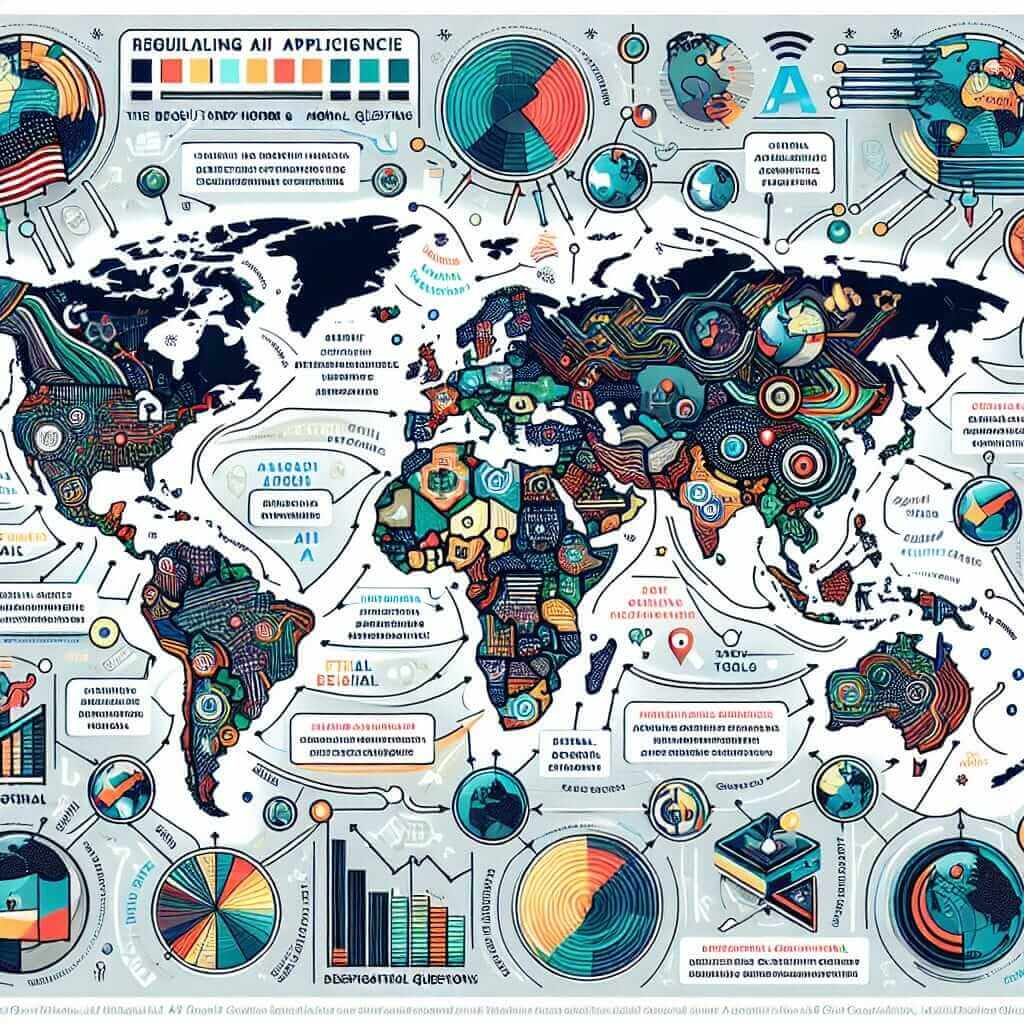When preparing for the IELTS Reading section, it is essential to familiarize yourself with a diverse range of topics. One emerging and highly relevant subject that may appear on the exam is the regulation of artificial intelligence (AI) in global markets. Understanding the intricacies and challenges associated with this topic not only enhances your comprehension skills but also keeps you updated on current global issues. Given the increasing dependence on AI in various sectors, this topic’s relevance is likely to grow, making it a viable candidate for future IELTS exam texts.
The Reading Passage
Regulating AI in Global Markets
Artificial Intelligence (AI) is reshaping industries around the world, offering unprecedented advancements in efficiency, productivity, and innovation. However, the rapid evolution of AI technologies brings significant challenges in terms of regulation and governance, particularly in global markets.
One of the primary challenges is the lack of a unified regulatory framework. Different countries have varying standards and regulations, leading to fragmentation. For instance, while the European Union has broad and stringent regulations for data protection and AI ethics, other regions may have more lenient or nonexistent regulations. This disparity can lead to a lack of coherence in how AI systems are developed and deployed internationally.
Another major issue is the ethical implications of AI. Ensuring that AI systems are designed and operated ethically is a complex task. This requires comprehensive guidelines that address issues such as bias, transparency, accountability, and the potential for unintended consequences. For global markets, maintaining these ethical standards across borders adds another layer of complication.
Moreover, technological advancements often outpace regulatory measures. Policymakers face the difficult task of drafting and implementing regulations that can keep up with rapid innovations. This gap can lead to loopholes and regulatory gaps that companies may exploit, further complicating enforcement efforts.
The third challenge is enforcement. Even if robust regulations are in place, enforcing them across different jurisdictions with different legal and political systems can be a daunting task. International cooperation is essential, yet difficult to achieve due to differing national interests and priorities.
Lastly, balancing innovation and regulation is a perennial issue. Overregulation can stifle innovation and economic growth, while under-regulation can lead to uncontrolled risks and ethical dilemmas. Finding an optimal balance that supports technological progress while safeguarding public interest is crucial but challenging.

Reading Questions
Multiple Choice
-
What is one of the main challenges mentioned in regulating AI globally?
a) High costs of implementation
b) Lack of a unified regulatory framework
c) Limited technological advancements
d) Decline in market demand -
What is a significant ethical concern in AI regulation?
a) Reduction in job opportunities
b) Insufficient data storage
c) Bias and transparency issues
d) High operational costs -
What problem does the rapid evolution of AI technologies cause for policymakers?
a) Increased production costs
b) Lack of public interest
c) Difficulty in keeping regulations up to date
d) Reduced market competition
True/False/Not Given
-
The European Union has the most lenient regulations for AI.
True / False / Not Given -
Ethical AI systems require guidelines for transparency and accountability.
True / False / Not Given -
International cooperation in AI regulation is easily achievable.
True / False / Not Given
Sentence Completion
-
Fragmentation in AI regulations globally is caused by…
different countries having varying standards and regulations. -
Policymakers struggle to enforce regulations because…
of different legal and political systems across jurisdictions.
Answer Key
Multiple Choice
- b) Lack of a unified regulatory framework
- c) Bias and transparency issues
- c) Difficulty in keeping regulations up to date
True/False/Not Given
- False
- True
- False
Sentence Completion
- different countries having varying standards and regulations.
- of different legal and political systems across jurisdictions.
Common Errors
- Misinterpreting Keywords: Students often mistake key terms, leading to incorrect answers. For instance, confusing ‘unified’ with ‘unregulated.’
- Overlooking Detail: Skipping over small but critical details, such as the specific challenges related to enforcement and ethics.
- Guessing Answers: Rather than making educated guesses, ensure you find contextual clues within the passage.
Vocabulary
- Fragmentation (n.) [ˌfræɡ.menˈteɪ.ʃən]: the process or state of breaking or being broken into small or separate parts.
- Ethical (adj.) [ˈɛθɪkəl]: relating to moral principles or the branch of knowledge dealing with these.
- Accountability (n.) [əˌkaʊn.təˈbɪl.ə.ti]: the fact or condition of being accountable; responsibility.
- Jurisdiction (n.) [ˌdʒʊə.rɪsˈdɪk.ʃən]: the official power to make legal decisions and judgments.
Grammar Focus: Complex Sentences
Structure
A complex sentence is a sentence that contains one independent clause and at least one dependent clause.
Example
“Although technological advancements offer significant benefits, they frequently outpace regulatory measures, leading to enforcement challenges.”
Usage
- Independent clause: “they frequently outpace regulatory measures”
- Dependent clause: “Although technological advancements offer significant benefits”
Advice for High Reading Scores
- Practice Regularly: Regular reading practice helps improve speed and comprehension.
- Diversify Topics: Read texts from a range of subjects, especially current global issues.
- Vocabulary Building: Continuously expand your vocabulary, especially academic and topic-specific terms.
- Analyze Errors: Review your answers to understand mistakes and learn from them.
- Mock Tests: Take practice tests under timed conditions to simulate the exam environment.
By focusing on these strategies, you can enhance your reading skills and perform effectively in the IELTS Reading section.